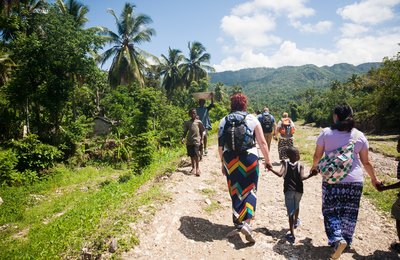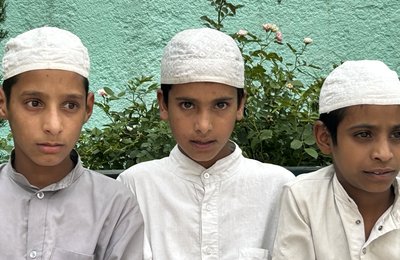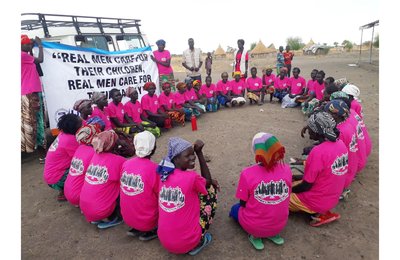 A professional Syrian storyteller. Image credit: yeowatzup
A professional Syrian storyteller. Image credit: yeowatzup“To tell one’s story is a human right” - Masha Hamilton, The Afghan Women’s Writing Project.
A large part of building peace and living in a world of peace comes from a state of empathy. As Mother Teresa said, 'if we have no peace, it is because we have forgotten that we belong to each other.' This state of belonging to each other stems from the fact that we are not only individuals, but also a part of the whole that constitutes the universe. This state of belonging to each other stems from the shared notions of happiness and suffering and the crests and troughs that life offers. Suffering is simply a part of the human condition, and comes from our own existence as separate bodies reacting to emotions and our rational mind.
It is a very human tendency to be attached, to crave fulfillment from our experiences, and to seek outcomes that we want. It is also as much a human tendency to fear the unknown and the impermanence of life, especially when we are challenged with the potential or actual loss of those that we love. We cling to externalities that are always changing – while being rooted in our own story – and that in turn, results in a state of separation from one another and the truth. Ultimately, all that we each seek is the discovery of our true selves.
Storytelling is effectively what it is named: telling a story. The difference, though, when it is brought to fore in peace work, is that it is not the narration of an imaginative tale – although some curriculums may be broad enough to include it - but rather the rendition of one’s own true story. Storytelling is presented as “an accessible, flexible means by which a community might examine values embedded in its traditional stories with an eye to abandoning strife – conducive values and transforming destructive storytelling into constructive.”
Fundamentally, storytelling as a peacebuilding tool is a perfect example of decolonising peace. Decolonising peace arises “from a decolonization of the mind; from the cognitive and emotional understanding that individuals do not necessarily need expert outsiders and their resources to shape their daily lives, or more importantly, to bring them peace.” Storytelling is effectively a route to decolonising one’s mind, since individuals arrive at a cognitive and emotional awareness of how potent a tool for change they are. All they need to do is to speak their own narratives: one does not need an expert outsider to help alter the course of their everyday lives; one does not need to find peace outside when the answer is truly within.
The functionality of storytelling as a concept emanates from the notion that conflicts stem from the bad stories that we hear about ourselves, others, the past and the future. Almost all of our suffering is in our mind: guilt or depression over things that have occurred in the past, or anxiety over the past or future. We can carry in our memories anger, guilt and especially resentment towards people who have mistreated or betrayed us even long after those nasty people have departed or died, or we can choose to empty this mental backpack instead of lugging around our treasured old garbage.
Building bridges with words
We cannot change a narrative, of course. Our baggage is indeed our own to carry – but getting the load off one’s chest by telling true stories can help pave the way. It helps in facing the truth to understand who we are, where we come from and what has been our past, we become capable of understanding our strengths and weaknesses, and build bridges with others by listening to them with empathy.
There is an element of mutuality created in the process of storytelling – inherently because it is a shared activity where all those that are involved participate in it fully. It creates room to be emotionally accessible to retain that connectivity. When this empathy is created, it prevents violation of every sort, simply because if a person is empathic to another, they will not engage in the kind of conduct that might cause the other person a violation.
Countering stereotypes, building empathy
When one hears stories from the other side, they become aware of the other side, they understand that everything that meets the eye is not necessarily true, and that there are stereotypes that need deconstruction. In the process of listening to stories as they are told, a room full of strangers can become a room full of familiar and congenial people with amity. Listeners gain by deconstructing stereotypes and social stigma. They can also release their own issues by experiencing and by empathising with the others who speak out. Listeners can understand that triggers don’t hold any importance any longer. Listeners can come to understand and experience the other side – for instance, a perpetrator might do well to gain insights into what a victim or a survivor may feel.
The storyteller benefits through listeners and witnesses, through sharing their burdens of hurt and suffering. We create the conditioned suffering by our desire to defend our stories – our business cards so to speak – and our picture of who we think we are. Storytellers can speak the truth for the first time, and be heard without being judged or questioned. If we don’t let go of our issues, we become attached and comfortable with our suffering and our victimhood. It doesn’t matter if one is a perpetrator or the wronged, it only matters that they want to speak out. That comes from the notion of wanting to learn to question our reality.
Collectively, for both the teller and the listener, the dialogue and cross-current of information shared through storytelling can create tremendous emotional healing. With physical and emotional stress, actual changes in the body can and do occur. Ultimately, it is our life’s purpose to first feel ourselves as part of a deep uniting experience, and then to help others have that same experience
Storytelling: a powerful peacebuilding tool
Storytelling has tremendous potential to exacerbate altogether, or to at least transform social conflicts. In the process of telling their stories, storytellers have the potential to effect change and make an impact of a lasting kind on their cultures and the implications they have on those that perceive them from the outside. Storytelling has all the trappings of a good peacebuilding mechanism: it doesn’t need highly advanced technology, it doesn’t need a precondition of literacy or affluence, and it simply doesn’t need a medium – because it is transcendental. In effect, stories are a tool of 'enculturation', in that they engage both the teller and the recipient in a collaborative process of making a meaning and a message stand out of experiential living, while deconstructing myths, misconceptions, stereotypes and constructing values of empathy and tolerance.
Constructive storytelling is capable of assisting in the process of peacebuilding. The storyteller enters a conflict situation and functions like an ambassador or a diplomat – as the listener is an onlooker, looking into the situation within from the outside. Where storytelling and sustainable cultural diversity are concerned, the medium’s accessibility and flexibility greatly recommend its use in long-term peacebuilding.
The ability to be open to people all over the world impacts the comprehension of the very quintessence of human nature. The tales of bravery that one recounts: of escaping traumatic treatment through domestic violence, of dealing with adversity of a crippling nature, or of getting out of a challenging reality just out of pure courage have tremendous power in revolutionising the lives of many people that listen and learn from these stories. In the process, people learn to empathise at the tragedies they learn about, and gain from the strength that is developed. Storytelling or story-sharing is the best mechanism of peace that there could be. The creation of empathy is long lasting, impactful and heavily influential in bridging and bridling differences that could potentially culminate in conflict.









